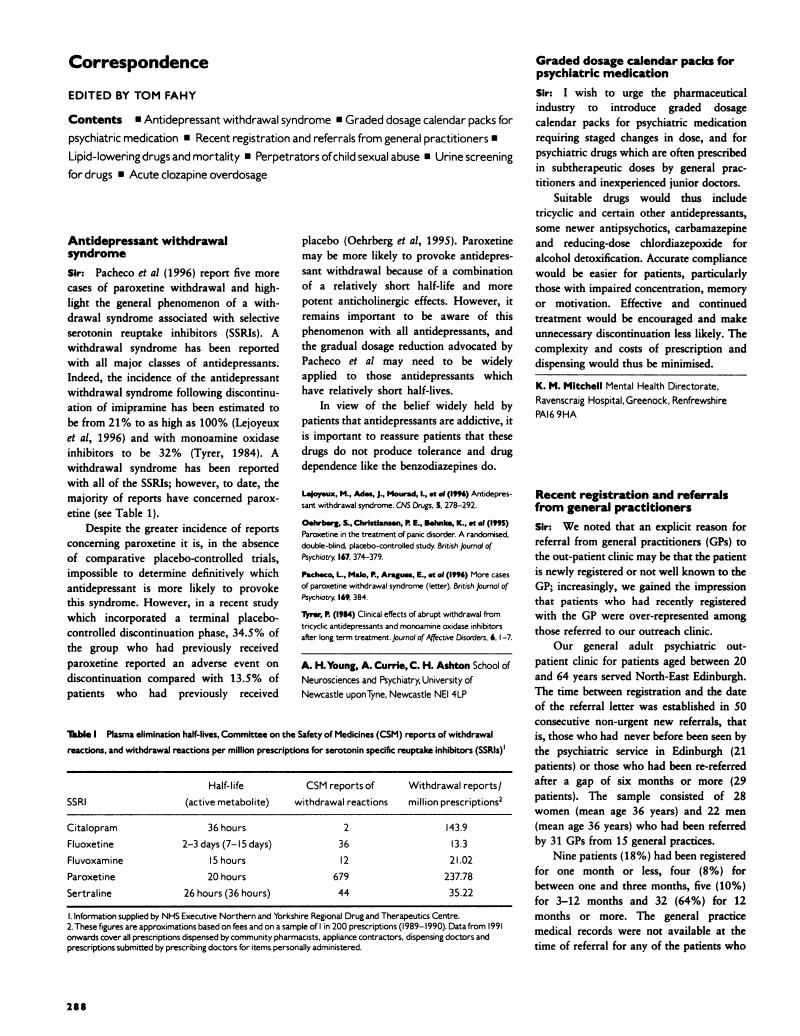Crossref Citations
This article has been cited by the following publications. This list is generated based on data provided by Crossref.
Haddad, Peter
1998.
The SSRI discontinuation syndrome.
Journal of Psychopharmacology,
Vol. 12,
Issue. 3,
p.
305.
McGahuey, Cynthia A
Delgado, Pedro L
and
Gelenberg, Alan J
1999.
Assessment of Sexual Dysfunction Using the Arizona Sexual Experiences Scale (ASEX) and Implications for the Treatment of Depression.
Psychiatric Annals,
Vol. 29,
Issue. 1,
p.
39.
Fernando, Antonio T.
and
Schwader, Patrick
2000.
A Case of Citalopram Withdrawal.
Journal of Clinical Psychopharmacology,
Vol. 20,
Issue. 5,
p.
581.
Sempere, Ermengol
Martínez, Inmaculada
Martínez-Mir, Inocencia
and
Rey, Antonio
2000.
Síndrome de discontinuación y citalopram.
Medicina Clínica,
Vol. 114,
Issue. 9,
p.
359.
Deahl, M
2001.
Pharmacological treatment of depression: the role of paroxetine.
Hospital Medicine,
Vol. 62,
Issue. 1,
p.
38.
Deahl, M
2001.
The role of paroxetine in treating depression.
Practice Nursing,
Vol. 12,
Issue. 1,
p.
23.
MacQueen, Glenda
Born, Leslie
and
Steiner, Meir
2001.
The Selective Serotonin Reuptake Inhibitor Sertraline: Its Profile and Use in Psychiatric Disorders.
CNS Drug Reviews,
Vol. 7,
Issue. 1,
p.
1.
Haddad, Peter M.
2001.
Antidepressant Discontinuation Syndromes.
Drug Safety,
Vol. 24,
Issue. 3,
p.
183.
Sanz, Emilio J
De-las-Cuevas, Carlos
Kiuru, Anne
Bate, Andrew
and
Edwards, Ralph
2005.
Selective serotonin reuptake inhibitors in pregnant women and neonatal withdrawal syndrome: a database analysis.
The Lancet,
Vol. 365,
Issue. 9458,
p.
482.
Jha, Manish K.
Rush, A. John
and
Trivedi, Madhukar H.
2018.
When Discontinuing SSRI Antidepressants Is a Challenge: Management Tips.
American Journal of Psychiatry,
Vol. 175,
Issue. 12,
p.
1176.
Chiappini, Stefania
Vickers-Smith, Rachel
Guirguis, Amira
Corkery, John Martin
Martinotti, Giovanni
and
Schifano, Fabrizio
2022.
A Focus on Abuse/Misuse and Withdrawal Issues with Selective Serotonin Reuptake Inhibitors (SSRIs): Analysis of Both the European EMA and the US FAERS Pharmacovigilance Databases.
Pharmaceuticals,
Vol. 15,
Issue. 5,
p.
565.




eLetters
No eLetters have been published for this article.